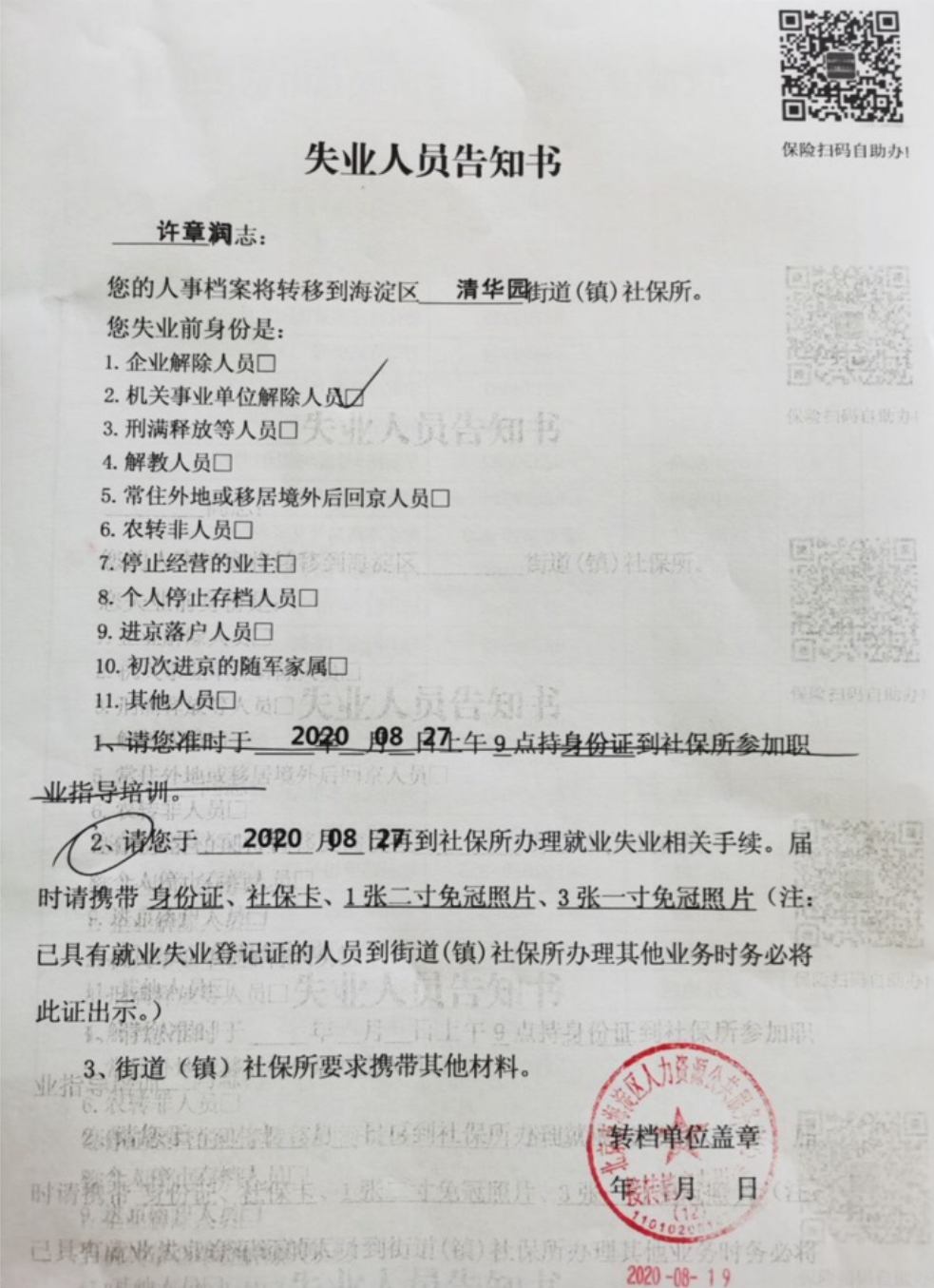Xu Zhangrun vs. Tsinghua University
The following announcement was released online by Sun Nutao 孫怒濤 on 31 August 2020. Along with Yan Huai 閻淮, who is seventy-five, the seventy-eight year-old Sun has been active in supporting Xu Zhangrun 許章潤 during his travails with Tsinghua University (see, for example, Yan Huai 閻淮, ‘Rashomon & Growing Pains at Tsinghua University’, China Heritage, 10 May 2019). More recently, Sun and Yan played a key role in organising fellow Tsinghua graduates to support Xu financially after he was summarily dismissed by the university in early July this year (see ‘Responding to a Gesture of Support — Xu Zhangrun’, China Heritage, 19 July 2020).
Sun Nutao’s notice — ‘Hawking the Work of Mr Xu’ 替許先生賣文 — is as much a gesture of solidarity as a novel form of passive-aggressive protest. The writer attaches Professor Xu Zhangrun’s letter to the Fairbank Center for Chinese Studies at Harvard University to his appeal both to alert online readers to the contents of that work and to provide an example of its author’s unique literary style and uncompromising political stance. We append the bilingual version of this letter here, yet again (it originally appeared in these pages on 19 August as ‘A Letter to the Fairbank Center for Chinese Studies at Harvard University’ and again as part of ‘Let the Record Show — an Account of Xu Zhangrun’s Protest and Resilience’ by Bei Ming 北明 (30 August 2020).
***
If one might speculate as to what Professor Xu and Xi Jinping, the man Xu refers to using an autocrat’s moniker ‘The Ultimate Arbiter’ 一尊, share in common it is, perhaps, cacoethes scribendi, the urge to write. Cacoethes scribendi is often used tongue-in-cheek to describe those whose writings get them into trouble. Xu Zhangrun’s furious writing is born of an inspired obsession. The graphorrhoea of Xi Jinping, China’s anointed Chairman of Everything, Everywhere and Everyone, however, is the reflux of one whose voice would silence all others. (See ‘Peak Xi Jinping?’, ChinaFile, 4 September 2018.)
Political ideas, cultural hopes, social aspirations all are cast onto the grand Bonfire of the Vanities inaugurated by Xi Jinping and the cabal of apparatchiki charged with the ongoing inquisition.
During the twentieth century, China experienced what is known as the Enlightenment 啟蒙 of the New Culture Movement (1917-1927), part of the disavowal of over two millennia of dynastic autocracy. Over half a century later, the New Enlightenment 新啟蒙 of the 1980s reflected the strenuous efforts of thinkers, students and cultural creators to reject the autocracy of the Mao era and the Communist Party.
It is inevitable that the present conflagration ignited by the Communist pyromaniacs will end in smoldering embers and cold ash. Just as Mao’s shade lingers on decades after his death, it is far from certain that Xi Jinping’s shadow will lift from China in the foreseeable future. However, there is no doubt that, just as tens of millions of Mao’s works were pulped in the late 1970s and early 1980s to make way for a national rebirth, there is no doubt that the dead letter of Xi Jinping’s oeuvre will similarly be consigned to the pulping mills of history.
The troublesome septuagenarians Sun Nutao and Yan Huai were called in for questioning by the Beijing security authorities, reprimanded and issued a formal warning. Yan was placed under a regime of ’24/7 residential surveillance’.
— Geremie R. Barmé
Editor, China Heritage
4 September 2020
***
Related Material:
- Bei Ming 北明, ‘Let the Record Show — an Account of Xu Zhangrun’s Protest and Resilience’, China Heritage, 30 August 2020
- Xu Zhangrun 許章潤, ‘Put a Stop to the New Personality Cult Immediately’, in ‘Imminent Fears, Immediate Hopes — a Beijing Jeremiad’ 我們當下的恐懼與期待, China Heritage, 1 August 2018
- The Xu Zhangrun 許章潤 Archive, China Heritage, 1 August 2018-
- GR Barmé, ‘Peak Xi Jinping?’, ChinaFile, 4 September 2018
- GR Barmé, ‘Pulping Mao’, in Shades of Mao: The Posthumous Cult of the Great Leader, New York, 1995, pp.5-11
A Message from a Volunteer
Literary Agent
Hawking the Work of Mr Xu
替許先生賣文
Sun Nutao
孫怒濤
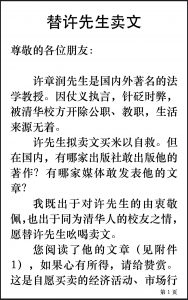 Respected Friends,
Respected Friends,
Mr Xu Zhangrun is a legal scholar celebrated both here in China and internationally. Tsinghua University has cashiered him from his job and stripped him of his teaching credentials. Mr Xu was subjected to this punishment for courageously championing the ideas of decency and justice. In his writings he has repeatedly condemned the ills of the day. As a result, he has been deprived of a livelihood.
Mr Xu has declared he intends to survive by dint of his own labour as a writer. [See: Xu, ‘Responding to a Gesture of Support’] But I ask you: What publishing house in China would now dare accept his work? Is there any media outlet courageous enough to publish anything he writes?
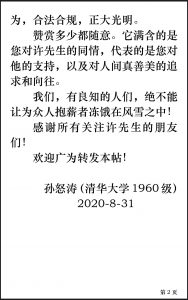 As a graduate of Tsinghua University and out of my heartfelt respect for Mr Xu, I am hereby taking it upon myself to promote and sell his work on his behalf.
As a graduate of Tsinghua University and out of my heartfelt respect for Mr Xu, I am hereby taking it upon myself to promote and sell his work on his behalf.
If, upon reading the attached essay (see below) [Xu’s letter to Harvard University] you are so moved, please feel free to show your appreciation. I would hasten to add that this is a simple commercial transaction abiding by market laws that in no way contravenes relevant regulations. I am undertaking this appeal and openly and in a manner that is entirely above board.
Feel free to express your appreciation of Mr Xu’s work with any amount you deem appropriate. To do so is an expression of your sympathy for Mr Xu and represents your support for him. Contributions also symbolise our shared pursuit of and faith that truth, goodness and beauty will come to reign.
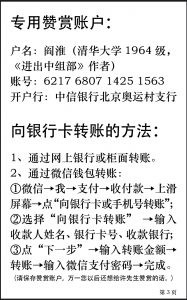 During these chill days of wintry darkness people of conscience should not stand by idly as a man like this endures such deprivation.
During these chill days of wintry darkness people of conscience should not stand by idly as a man like this endures such deprivation.
Let me take this opportunity to express my thanks to all those dear friends concerned with the fate of Mr Xu. Please broadcast my message online far and wide!
Sun Nutao
Tsinghua Class of 1960
31 August 2020
[Bank Details: Account Name: Yan Huai; Acc. No.: 6217 6807 1425 1563; Bank: China CITIC Bank, Beijing Olympic Village Branch, etc.]
***
The Hypergraphia of
The Chairman of Everything
Tenet insanabile multos scribendi cacoethes
— Juvenal
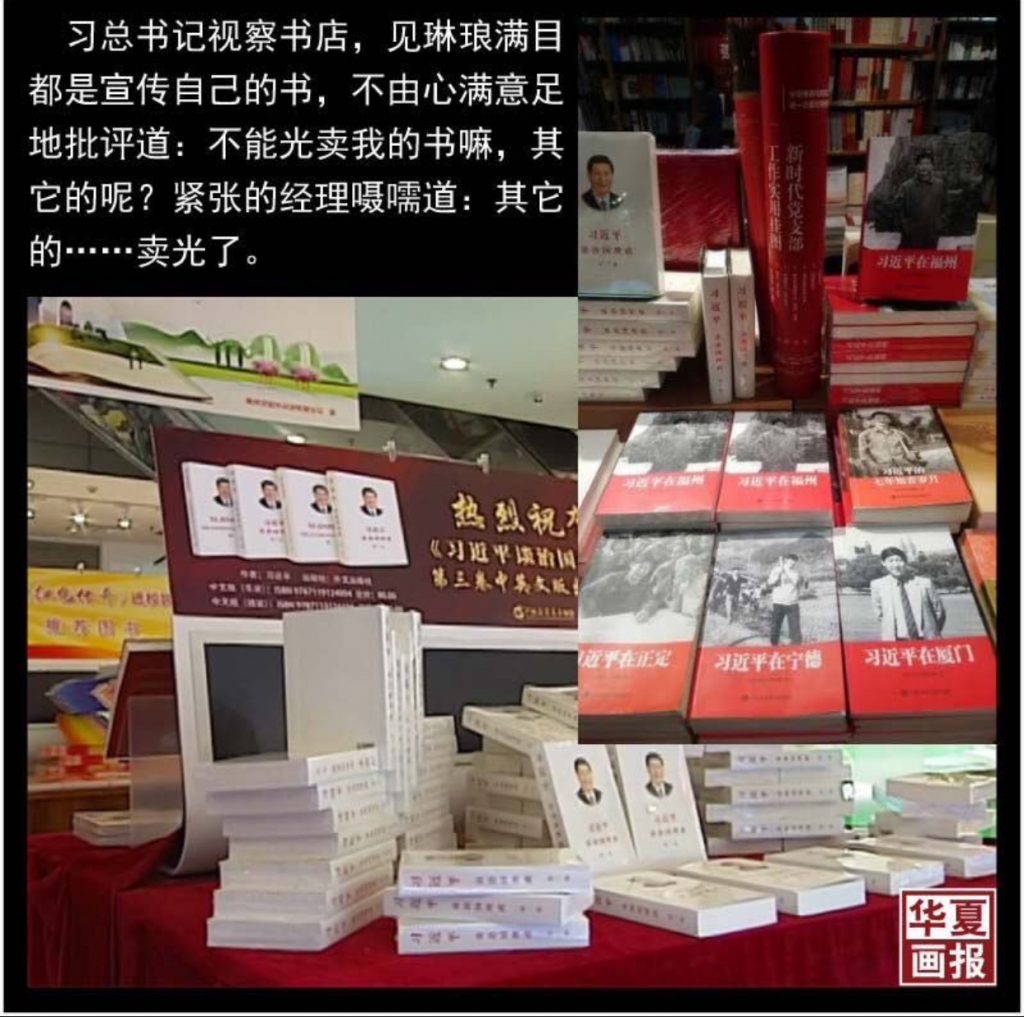 During an inspection tour of a bookstore General Secretary Xi Jinping realises that all of the books on display are devoted to his work. Despite his smug self-satisfaction, he chides the manager: ‘Surely, you can’t only stock my work. Where are all the other books?’ The manager mumbles nervously: ‘Other books?…. They’re all sold out!’
During an inspection tour of a bookstore General Secretary Xi Jinping realises that all of the books on display are devoted to his work. Despite his smug self-satisfaction, he chides the manager: ‘Surely, you can’t only stock my work. Where are all the other books?’ The manager mumbles nervously: ‘Other books?…. They’re all sold out!’
***
Cacoethes Scribendi
Oliver Wendell Holmes Sr.
If all the trees in all the woods were men;
And each and every blade of grass a pen;
If every leaf on every shrub and tree
Turned to a sheet of foolscap; every sea
Were changed to ink, and all earth’s living tribes
Had nothing else to do but act as scribes,
And for ten thousand ages, day and night,
The human race should write, and write, and write,
Till all the pens and paper were used up,
And the huge inkstand was an empty cup,
Still would the scribblers clustered round its brink
Call for more pens, more paper, and more ink.
***
Sun Nutao’s Attachment for Potential Donors:
To: My Dear Friends at Harvard University
From: Xu Zhangrun
19 August 2020
Translated & Annotated by Geremie R. Barmé
My Dear Friends at Harvard University,
It was with heartfelt delight that I recently received your formal invitation to become an Associate in Research at the Fairbank Center for Chinese Studies at Harvard University.
For over sixty years, the Fairbank Center has been home to the pursuit of scholarship that has constantly added to a tradition of learning, one enhanced over the generations and that has accumulated thereby a formidable record of acumen and academic knowledge, the depth and breadth of which all who know you are witness. You are truly a global center for the study of Chinese, China and Sinology. [Note: 漢學 Hàn xué, both ‘the study of things Chinese’ and the tradition of learning the origins of which date back over the millennia, also a term for ‘Sinology’].
To receive this invitation at this moment, a fraught juncture in my life, is deeply meaningful. For me, your gesture and the spirit of fellowship that it represents has dissolved in an instant the great physical distance separating us. Now, thus drawn into your presence, as true comrades in heart and mind, I must share my feelings of gratitude and felicity.
致敬哈佛諸君
頃接聘書,衷心歡喜。一個甲子裡,哈佛費正清研究中心慘淡經營,薪火傳繼,積勞積慧,燦然大觀,蔚為世界漢學中心。此時此際,受其邀,擔其職,膺其位,天涯咫尺,心理攸同,與有榮焉。
For me, status as an Associate in Research at the Fairbank Center [which is not a salaried position, or one with fixed duties] is for me actually a substantive appointment, one that excites my core interests. This invitation is one that further encourages me to read, something that is a beloved pursuit fueling my continued intellectual journey, and affirms my obsession with writing, an activity that gives form to my mental labours. This appointment resonates with my vocation, one that Confucius described as being the ‘scholar attuned to the Way’. For I am one of those whose heart-mind dwells on the cavalcade of worldly events while also being someone who seeks to discern a deeper meaning and a moral order in the world. In this enterprise, truly, there is no schism between China and the West.
An appointment as an Associate in Research at the Fairbank Centre may be a relationship in name only. Even though this honour is not burdened either with duties imposed by an emolument or the need for me to exercise my pedagogical ability, nonetheless, it engages directly with the things of greatest consequence — be they related to kith and kin, or those that touch on the life-pulse of the nation itself. They are, after all, matters that both reflect and excite our shared humanity. And it is in the pursuit of these concerns — from the particular and the personal to the social and the political — that a scholar is inspired to rise daily at an early hour and forgo sustenance until late at night, devoting their time instead to reading and their studies. For the learned such a discipline pertains as much today as it did of yore. Having said all of this, however, I would emphasise once more that I recognise your generosity of spirit in extending this invitation to me. So, allow me to give voice to my heartfelt thrill once more, for your gesture is one of exemplary significance; it is freighted with undeniable symbolic weight. After all, everyone who is aware of the vicissitudes that have led to this moment, and to which this invitation also addresses itself, share a sense of outrage.
職為實職,無外乎讀書以致思,作文而講理,則士志於道,風聲雨聲皆為心聲,而義在其中,無分中西;位乃虛位,既無薪酬,亦無教務,則家事國事都是人事,惟起早貪晚,勤勉用功,不論古今。毋寧,諸君慨然,吾意欣然,其心旨在標舉,其意志在象徵,而滄桑同愾者也。
The exemplary significance of this invitation relates directly to indomitable individuals with unbending character, as well as to those who would truly champion ‘an independent spirit and intellectual freedom’. [Note: a famous expression formulated by the Tsinghua University historian Chen Yinque when he wrote an epitaph to celebrate his friend and colleague Wang Guowei following the latter’s death in 1927]. After all, if one lacks an independent spirit there is little chance that you can ever ‘break free of the shackles of mundane ideologies’. [Note: Another quotation from Chen Yinque that, at the time, referred to various political dogmas and intellectual vested interests.] Without intellectual freedom how can scholars possibly traverse the boundless realm of the mind without impediment?
For it is through Independence and Freedom alone that we mere flesh-bound mortals, individuals inured to this commonplace life in a secular world, can hope to aspire to the sublime. And it is in that we may pursue both plenitude and advancement, even as we live in a tireless diurnal reality calibrated by the rising sun and the waning moon. So then we strive, no matter how hesitant our step or how inconsistent the passage forward may prove to be.
It is here, yes, in the here and now, that those who are devoted to the life of the mind can follow The Way of Learning and resist thereby the blandishments of power. They can offer some worthy model of rectitude to those countless others who would seek it, and even have the courage to persist no matter ‘that there is a sharpened sword above one’s head, hanging there by the thinnest simple thread.’ And so I too will persist and refuse to submit and in this truly intersect with eternity.
其所標舉者,獨立精神、自由思想與不屈人格也。非精神之獨立,無以脫俗諦。無自由之思想,哪會有精神之浩瀚縱橫,無遠弗屆。唯秉此獨立與自由,這此界肉身與俗世人生方才秉持超越性,而於日昇月恆中堵漏補缺,踉蹌前行。在此,也正是在此,讀書人從道抗勢,以人格不屈為萬民標本,哪怕斧鉞懸頸,吾人不屈,江河萬古。
For me, your invitation is also freighted with symbolism, for it demonstrates that our words, our deeds, and our heart-minds as well, are hereby linked in a glittering skein of intellectual mutuality. For scholarship is both a universal value and a shared bond, one forged in the pursuit of the public good. I have dedicated myself to studying the meaning and significance of Law. It is an effort aimed at clarifying the principles of justice. In devoting myself to this end, I have lived and breathed the Law as an academic discipline for four decades. In the process, I have also focussed on instructing others without respite; in the pursuit of Truth in the name of Law, I advocate the study of justice. Such sentiments are shared by scholars everywhere and they underpin a jointly held commitment to the freedom of thought.
Actually, we — that is, you, my colleagues, and me — exist together in the Kingdom of the Spirit. That is where we spend our days in toil, as if in intellectual servitude. It is there, too, that our ties of fellowship are sustained and advanced in the give-and-take of inspiration. We share our ideas in the common pursuit of Truth and encourage each other to follow The Way [of scholarship, learning and meaning]. That is why, even as I may be on the path to the Yellow Springs [that is, the underworld, or death], I know that in spirit my arm is linked in yours and that our hearts touch. On that journey I will never feel alone.
Moreover, I am unwavering in the belief that, even though justice may be long delayed, it cannot forever be denied. By the same token, I know you must be ready to lose your head if that dawn is to come. Be the days dark, we share this common bond, and the devotion to knowledge in our heart-minds lights the way ahead. Our spirits, undaunted, call out to that which is yet to come. Though we weather gales and storms, the crow of the dawn rooster beckons. Harrowing may be the path, yet majestic is our progress.
其所象徵者,聲聲相應、心心相印、燈燈相映也。學術乃天下之公器,法意以明理為己任。在下以法學為業,法學院起居四十載,自當奉守此訓,不敢稍懈,而以追求真理、捍衛公義為職志。此為天下書生之共性,而為自由思想之本根。本來,同為精神王國的思想奴工,誼之於思,喻之在義,而勉之以道。如此,則黃泉道上,攜手同行,心照神交,吾道不孤。更在於吾人堅信,正義踟躕於途,但總會來到,蹤便為此必須獻上頭顱。由此,至暗時刻輓臂前行,心火相映中燭照前路,神流氣鬯中呼喚未來,而風雨如晦,雞鳴不已,痛何如哉,快何如哉!
When contemplating the state of education in my homeland today, I am nostalgically awed by an enterprise that did once boast of a tradition both ancient and majestic. Coruscating in its brilliance, heretofore it enjoyed a heritage that reflected true grandeur. Yet, in modern times [from the nineteenth century], Chinese education lost its way and fell into desuetude. Over time, there came to be a precious few people who were sincerely inspired by the undeniable achievements of others and, determined to catch up, they forged a way ahead with singular resolution.
Then, tragically, more latterly [in the mid-twentieth century with the ideological contestation between the Nationalist Party and the Communist Party], and after having been subjected to injurious blows both from the left and from the right, unthinkingly, unimaginably, China’s modern universities, just like China itself, ended up becoming a fertile ground for the experiments of the engineers of modern-day ‘Legalist Fascist Stalinism’ [that is during the Mao era, 1949-1978]. [Note: ‘Legalistic-Fascist-Stalinism’ 法日斯 Fǎ-Rì-Sī is a formulation that Professor Xu uses to describe the Chinese party-state’s command-and-control ideology that is ‘cobbled together from strains of traditional harsh Chinese Legalist thought 法 (中式法家思想), wedded to an admix of the Leninist-Stalinist interpretation of Marxism 斯 (斯大林主義) along with a “Germano-Aryan” form of fascism 日 (日耳曼法西斯主義).’] China allowed itself to fall prey once more to an Other, this time becoming little more than a colony under the sway of Soviet-style misrule. With the country thus subjugated, its multitudes ended up as hostages who served the state as nothing more than value-generating pawns. For all intents and purposes, The People [despite claims made by the Communist propaganda-state that it alone represented ‘The People’ of China] disappeared and the sovereign rights of the nation were evacuated by an autocrat who occupied centre stage. What was left in the stead of actual, living individuals were but reams of statistics and data about taxable units. And so it came to pass that totalitarianism overwhelmed everything, and a government steeped in violence held sway over a nation that it ruled with lies.
China’s educational culture was profoundly tainted by their barbarism, and the livelihoods of the people were regarded as nothing more than dust and ashes. In those decades, tens of millions of souls perished, countless were those who starved in their very homes while the numbers of those struggled to death in their own homeland were beyond calculation. The heavens responded to the outrage of the people with a fury of its own. Even now, one can only contemplate that history in muted horror.
Later still, those so-called ‘Economic Reform and Open Door Policies’ actually showed that the Communists were, to an extent, willing to admit the errors of the past and act on that awareness in a way that recognised undeniable reality. There was a fitful move to ‘humbly recognise and pay respects’ [to other nations, societies and economies that were more advanced and civilised] and, gradually, there was a return to meaningful path of development. It was forced upon them, and it was only because of it that we were all finally able to enjoy a period of relative peace and prosperity. [Note: See ‘Humble Recognition, Boundless Possibility — Part I’, China Heritage, 31 January 2019; and,‘The State of a Civilisation — Humble Recognition, Boundless Possibility, Part II’, China Heritage, 8 March 2019.]
The unfortunate truth, however, is that, while The Rivers and Mountains [of China] may have passed into the hands of new rulers [after Mao’s death], the nature of its totalitarianism remained obdurate and resistant to substantive reform. The self-preservation embedded in the structures of this narcissistic polity means that a peaceful political transformation has proved to be impossible. When China once more, finally, confronted the pressing need to make one truly significant effort to become a modern nation [that built on a socio-political and economic process dating from the Self-strengthening Movement of the 1860-70s], a deep-seated inertia reasserted itself. The smoldering embers of autocratic ambition have been reignited, for [the Powers That Be, that is Xi Jinping et al] are obsessed with their proprietary claims over ‘The Rivers & Mountains’ [that is, the geopolitical and numinous territory of China. See ‘Ruling The Rivers & Mountains’, China Heritage, 8 August 2018] and they have pitted themselves yet again against the universal valency of modern civilisation. In their arrogance they reject out of hand the idea that the People should enjoy true sovereignty, just as they deny that a nation should be founded on the principles of a true republic [that is, one based on constitutional democracy of the kind advocated when the Republic of China was founded in 1912, rather than on a ‘people’s democratic dictatorship’ of the kind imposed by the Communist Party from the 1950s]. For eight long years [since Xi Jinping’s rise to power in late 2012], their system has doggedly protected an outmoded and flawed totalitarianism and they have pursued policies that amount to a retreat into the past. Yet again, the rulers have set China and all that it can promise in stark opposition to the kind of universally recognised form of politics based on what I have repeatedly called ‘constitutional democracy reflective of a substantive people’s republic’.
In the process, with their vainglorious gestures they have been frittering away the immense stores of wealth accumulated as a result of the blood, sweat and tears of countless Chinese [during the decades of the Economic Reform and Open Door policies initiated in 1978]. [Note: for Professor Xu’s critique of this profligacy, see ‘Imminent Fears, Immediate Hopes — a Beijing Jeremiad’ 我們當下的恐懼與期待, China Heritage, 1 August 2018.] Today, we are witnessing the shocking possibility that the hard-won achievements of generations of my fellow Chinese may well be undone overnight. If the fate of the nation is thus imperiled, once more will the livelihood of everyday people be at grave risk. If you need any evidence of the looming danger, witness what is happening right now!
回頭一望,吾邦文教風華,源遠流長,也曾流金溢彩,光前啟後。近世落伍,破敗衰頹,而終究見賢思齊,急起直追,強毅力行。不幸晚近以還,左衝右突中,不期然間,淪落為法日斯主義之試驗場,屈陷成蘇維埃惡政之殖民地。邦國既為殖民地,億萬生民乃成待典人質與納稅勞力。人民消失,主權者缺位,僭政當道,有的只是數目字戶口與稅收單位。於是,極權橫霸,恃殘暴執政,以謊話治國。野蠻所致,文教隳頹,生民塗炭,幾十年裡,數千萬同胞餓斃在家園,鬥死於祖國,神怒民怨,夫復何言。後來之所謂「改革開放」,意味者面對時勢,有所悔悟,低頭致意,漸歸正道,不得不然,這才讓大家過上了幾天好日子。可惜,江山易改,而極權本性難移,體制之自我中心保全本質決定了和平轉型之不可能,於是,歷史大轉型走到最後臨門一腳之際,充血既足,野心復燃,心心念念的還是唯有「江山」二字,則一意抗拒現代普世文明,拒絕承認人民主權及其共和理想這一現代立國之本,孜孜抱殘守缺於極權專政,遂有八年來的倒行逆施,再度置華夏治道於「立憲民主,人民共和」這一普世政道之對立面,而將此前億萬國民之血汗積攢幾乎揮霍殆盡,令幾代人辛苦打拼之局面恐將毀於一旦,國運之岌岌危殆,民生乃難免遭殃,立見目前矣!
Ah, You Communists are so arrogantly confident that you possess a monopoly over the truth. But if that is really the case, why are you so afraid of mothers and children even opening their mouths? And why are you unsettled by the festive laughter of everyday men and women?
Long ago you occupied all of the prime real estate in our country, still you are not satisfied and you constantly issue new orders for the forced relocation of people and demolitions [to make way for your projects]. [Note: see 許章潤, ‘踐踏斯文必驅致一邪魅人間’, 25 June 2020.] Why can’t you tolerate women who truly wish to celebrate their femininity, or the raucous bustle in the cities? Why are you so jealous of the fact that the common people can finally afford the modest indulgences of the good life?
You hold the power of life and death over others; your will and whims decided who will flourish and who will come undone. That’s why, by all rights, you have no good reason to be so fearful of the fresh flowers placed on new graves, or the sorrowful tears of widows.
The very skies and earth, why, the air itself — why, you claim dominion over them all! Your power courses through the land with impunity and in your miscreant behaviour you evince no heartfelt trepidation, even when confronted by punishing calamities: be it the surging floodwaters or the plague that has scarred our land. [Note: Here the writer is referring to the calamities of 2020.]
This reflects a truth that has been unchanged from the days when you first came into being: you are contemptuous of everything civilised and decent; you are determined to befoul whatsoever is beautiful in humanity; you cannot tolerate the fact that the people just want a peaceful and happy existence. Even less do you have any real notion of the pleasures and delights of normal existence, for you worship at the altar of crude violence. In your pursuit of your evil calculations you cleave to the ingrained habits of fraudulence and treachery. Why? Simple: because really you are indeed afraid, and you are scared of everything. Why, you are even unsettled by yourselves! That’s because you know all too well that the only thing that can be detected in your empty hearts is the obsidian gloom of the jail house.
吁,你們已經壟斷了真理,何必防範婦孺張口,男女歡笑。你們早就佔山奪田,動輒強拆,為何見不得女人撒嬌,市井喧騰,百姓碗裡有肉。你們有權裁斷生死,徑意萬民榮枯,本不該恐懼墓地的鮮花、寡婦悲傷的淚眼。你們管天管地管空氣,橫行霸道,卻居然不怕天打雷劈,洪流滾滾,瘟疫遍地。可事實是,從來就是,你們蔑視一切文明,糟踐一切人間美好,見不得生民安康,根本不懂風花雪月,唯獨崇拜粗蠻、善用奸詐與竭盡邪惡,原因正在於你們害怕一切,包括害怕你們自己,你們自己那如地獄一般幽暗的骯髒內心!
And that is why you have been unbending in your intention. It is why you revel in the fact that it is within your grasp and in your power to:
- Strip me of my calling as a teacher;
- Deny me access to a livelihood;
- Sever the lineage of my scholarship;
- Waylay me on my intellectual journey;
- Besmirch and insult my character; and,
- Restrict my freedom of movement.
On top of all of that, I know only too well that you may go so far as to throw me into jail. You may even choose to snuff out my life.
Yet, despite your best efforts, you will never be able to silence all of the poets who would speak of the desolate beauty of autumn, nor can you ever clamp down on the enticing yearnings of country maids. Human beings cannot be prevented from craving the world of sensation. This is more true now than ever before, since the People may chose to cast aside their fear. They have learned to delight in the enticing possibilities of nature and they observed the immutable cycles of change. [Note: this is a reference to the writer’s condemnation of Xi Jinping’s mishandling of the coronavirus in January-February 2020. See: ‘When Fury Overcomes Fear’, China Heritage, 24 February 2020.]
你們有意、有權也有力褫吾教職,斷吾生計,戕吾學脈,阻吾思旅,辱吾人格,困吾行止,乃至於縲紲吾身,滅絕吾命,可終究擋不住騷客悲秋,村姑叫春,寡人好色,更何況那草長鶯飛,日昇月落,憤怒的人民已不再恐懼。
Oh, Heavens Above, are you asking me? That’s right, I am addressing that Greater Principle of Life: the mists rise and swirl around the distant mountains, yet the zephyr wind of the west swells still, for I am alive, I AM STILL ALIVE! I am sustained by that selfsame source understood by people the world over: an unyielding faith in Dignity and Freedom. For these form the eternal gospel that stirs in the hearts of all humankind; it is the good news that reflects the values that make us, frail humans though we be, what we are!
The ineffable beauty of this world remains yet, for do you not still see the sweet, sorrowful hurt in humble towns, something that no force should be allowed to sully? Even though this great land is reduced to silence once more, in the depths of night Lady Meng Jiang [whose bitter tears breached the Great Wall built by the despotic First Emperor of Qin, to whom both Mao and Xi Jinping have been compared] is preparing herself to sally forth, for flurries of snow are gathering at the foot of the Great Wall.
I appeal to that Higher Power, that Greater Principle of Life, above: look down upon this world of ours, observe this realm of wondrous variety. How can the unimpeded rampage of these ‘abhuman dementors’ be tolerated?
Dear friends, allow me once more to express my gratitude to Harvard University!
Xu Zhangrun
19 August 2020
哦,上天,你在問我?是的,上天吾王,遠山起霧,風在吹,我活著,我們依舊活著。撐持我們活下去的是你曾經諭示萬民、那個叫做尊嚴和自由的不屈信條,那個天下萬眾迴盪心田的人之為人的永恆福音!
人間美好,村子裡有溫柔的悲傷,不容玷污。大地沈默,暗夜中孟姜女在梳妝,雪舞長城。
上天吾王,你看,你再看啊,好一個大千人世,豈容邪魅橫行!
致敬哈佛,再謝諸君!
許章潤
2020年8月19日
***
[box]
The Four Bans Placed on Xu Zhangrun
四則禁令
Friends of Xu Zhangrun have revealed that after being summoned to a meeting with the Beijing security authorities last week he was notified that he was subject to a ‘Four Ban Order’ 四則禁令. That is, he is:
Banned from travelling outside of Beijing; banned from leaving China; banned from accepting media interviews; and, banned from receiving any financial support.
Reports in the international media quote Xu’s friends to the effect that the punitive measures taken by Tsinghua University in dealing with this outstanding scholar are evidence of a bestial intent. Now they are wielding the executioner’s blade quite blatantly. Their aim is to persecute Xu Zhangrun so that, impoverished and in ill health, he will eventually succumb to a lonely death, a despised man forgotten by the world.
… 許章潤的朋友透露,許章潤上周再度被北京的國保人員約談,其後就被知會要實施四則禁令,禁止離開北京及出境,禁止接受傳媒訪問,亦禁止接受任何資助。
國際媒體8月21日的消息援引許章潤朋友的話說,校方有關做法是對最優秀知識精英們露出獠牙,舉起屠刀,想讓許章潤貧病、孤獨、被遺忘和潑污而死。
— ‘許章潤再度被北京國保約談 遭4禁全面封殺’
《自由亞洲電台》, 2020年8月21日
***
Notification to Unemployed Personnel
